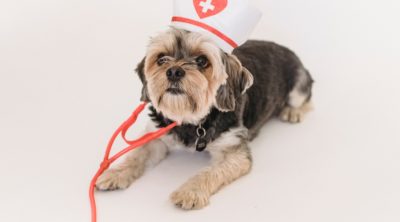An umbilical hernia puppy injury is a tear in your dog’s abdominal wall. During a hernia, your dog’s abdominal lining or organs are pushed out through the belly button region where the umbilical cord was attached at birth.
An umbilical hernia puppy injury is a fairly common problem which generally isn’t very painful if you get the problem fixed as soon as you can.
How Does An Umbilical Hernia Puppy Injury Happen?
In most cases, your puppy will begin to develop its umbilical hernia before birth. This happens because of the way that the umbilical blood vessels pass through the umbilical ring.
The purpose of this is to provide blood, oxygen, and nourishment to the developing puppy. Normally when the puppy is born, the umbilical ring is closed. However, sometimes this ring doesn’t close completely when the puppy is born.
When this happens the puppy becomes more likely to develop an umbilical hernia. You may notice the hernia as a little bump or swelling that appears on your puppy’s underside. The hernia is most noticeable when they’re standing or barking.
What Exactly Is an Umbilical Hernia?
There are two main types of umbilical hernias that your puppy might experience.
- Reducible hernias are the type of hernia that can basically be pushed back into the abdomen (by a qualified veterinarian).
- Non-reducible hernias are those which can’t be pushed back in. This means that whatever organs are herniated are going to be at least partially obstructed, which can lead to further health complications.
Umbilical hernias can be quite small – less than a quarter-inch – or much larger, reaching more than an inch in diameter.
Smaller hernias tend to be easier to manage. Some of them heal without having to be looked at by a veterinarian.
Larger hernias are less likely to close on their own. Any type of hernia that doesn’t close within a few months might require surgery.
In most cases, the hernia doesn’t hurt your puppy too badly. However, if they are left for too long, they can cause serious difficulties.
This usually happens when the hernia becomes strangulated. This happens when your pup’s organs or tissues are deprived of oxygen and blood. If this happens for too long, the tissue will die. If you think your puppy is experiencing strangulation then you need to get them to the vet for emergency surgery.
Treating an Umbilical Hernia in a Puppy
Most people prefer to wait until the time that their puppy is neutered to seek treatment for their umbilical hernia. If the hernia is going to heal on its own, it will usually do so by the time your dog is 3-4 months of age.
If it hasn’t healed up, then you can get the surgery done at the same time that you spay or neuter your pup. The vet will clean out any damaged or scarred tissues and patch your puppy up like new.
Conclusion
An umbilical hernia puppy problem is quite common, and fortunately can be treated easily. If you’re thinking of getting a new puppy, remember that you should get them checked for an umbilical hernia.


